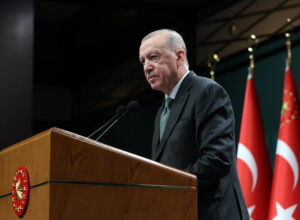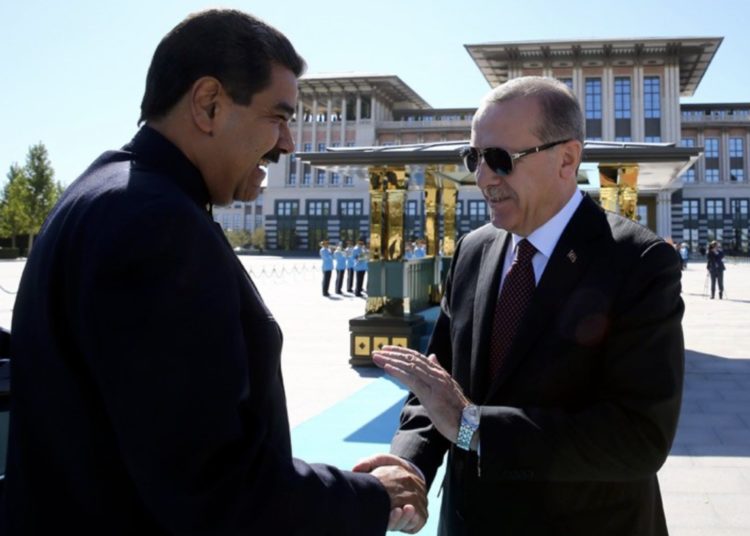Abdullah Bozkurt/Stockholm
A rare intervention by a group of internationally renowned scholars in a high-stakes US federal criminal case has placed Turkey at the center of an extraordinary warning to American judges: When prosecutors become instruments of political power, democracies do not fall suddenly, they decay from within.
The Amici Curiae University Professors and Scholars brief, filed on November 14, 2025, in the US District Court for the Eastern District of Virginia, argues that the indictment of New York Attorney General Letitia James bears troubling parallels to the early stages of authoritarian consolidation observed in countries that have suffered democratic backsliding.
To demonstrate the real-world consequences of politicized law enforcement, the scholars point to Turkey under President Recep Tayyip Erdogan as “an even more extreme example” of institutional capture and prosecutorial manipulation.
This filing is not a routine academic exercise. It is an attempt by leading experts on democratic erosion to warn a US court, one of the system’s last independent guardrails, about the dangers of allowing prosecutions to be shaped, influenced or driven by political motivations. The scholars argue that the James case must be scrutinized not only on its domestic legal merits but in light of global patterns that show how quickly the justice system can be weaponized by those in power.
The amici acted because the defense argues that the prosecution of James is a retaliatory, selective and vindictive effort. American courts seldom engage deeply with comparative evidence when evaluating such claims, leaving a gap in understanding how politicized prosecutions actually operate in countries where the rule of law has eroded.
To bridge that gap the scholars submitted a roadmap showing how political interference typically begins: with subtle pressures, strategic personnel shuffles, selective targeting of political opponents and quiet rewards for compliant prosecutors. These early signs rarely trigger alarm, until the system is too compromised to push back.
Brief of the Amici Curiae University Professors and Scholars concerning the Letitia James indictment in support of the defendant’s motion to dismiss the indictment for vindictive and selective prosecution:
The scholars emphasize that American courts must understand these early indicators because democratic decline almost never starts with a dramatic event. Instead, institutions are hollowed out through procedural manipulation and political meddling. Turkey, they argue, demonstrates this trajectory with “brutal clarity.”
The amici include some of the most influential scholars in the global study of authoritarianism and democratic resilience.
Harvard’s Steven Levitsky, co-author of “How Democracies Die,” outlines how leaders consolidate power through legal mechanisms that appear neutral but serve political goals. Stanford’s Larry Diamond and Francis Fukuyama contribute longstanding expertise on democratic institutions and state decay. Amherst College’s Javier Corrales, whose work dissects how Venezuela transitioned into autocracy, anchors the comparative framework.
Syracuse University’s David M. Driesen, author of “The Specter of Dictatorship,” provides the constitutional mechanics of how executives manipulate prosecutorial power. McGill University’s Maria Popova, a leading authority on politicized courts in Eastern Europe, explains how judicial systems in emerging democracies become tools to marginalize incumbents’ opponents.
Their collective experience spans Latin America, Eastern Europe, Eurasia and hybrid regimes worldwide, giving the brief unusual authority in mapping out how democracies unravel.
Although the brief examines Hungary, Poland, Venezuela and other states, it devotes its most detailed analysis to Turkey, calling it the clearest modern demonstration of what occurs when a leader captures the prosecution service and reshapes the judiciary to eliminate accountability.

The scholars illustrate how Erdogan began centralizing power years before a 2016 false flag coup attempt. By 2013, they note, he was “increasingly autocratic.” That year corresponds to major corruption investigations revealed in December 2013 that incriminated Erdogan, his family members and his business and political associates.
The first corruption scheme, exposed on December 17, centered on Iranian sanctions-buster Reza Zarrab, who used the Turkish financial and banking systems to launder funds on Iran’s behalf by bribing senior government officials. The second investigation, made public on December 25, focused on one-time al-Qaeda financier Yasin al-Qadi, who was secretly conspiring with Erdogan in an illicit real estate development scheme while also coordinating aspects of Erdogan’s Islamist policies in the Middle East, particularly in Egypt and Syria.
Erdogan shut down both investigations by abruptly removing police chiefs, prosecutors and judges in a series of highly controversial moves. He branded the probes a “judicial coup” and blamed them on the Gülen movement, a civil society group that had been critical of his government’s corruption and its covert support for jihadist organizations. Fethullah Gülen, who inspired the movement, denied any involvement in the probes, insisting that investigators were simply doing their job under the law and that, as a man of faith, he could not condone corruption in government.
Gülen’s public criticism of Erdogan’s pervasive corruption made his movement an immediate target. Erdogan weaponized the judiciary to punish Gülen and other critics with fabricated charges and to intimidate judges, prosecutors and law-enforcement officials into not pursuing any criminal cases against him, his family or his associates — even when overwhelming evidence warranted such investigations.
Attorney General Letitia A. James’ motion to dismiss indictment for vindictive and selective prosecution:
The US scholars point out that after becoming president in 2014, Erdogan engineered sweeping constitutional changes that weakened parliament, subordinated the judiciary and concentrated authority in the presidency.
The transformation accelerated dramatically after the 2016 coup attempt, which many observers believe was a false-flag operation orchestrated by Erdogan and his intelligence and military chiefs to justify a sweeping crackdown, push the Turkish military deeper into Syria and replace Turkey’s parliamentary system with an executive presidency stripped of meaningful checks and balances. In the immediate aftermath, nearly one-third of Turkey’s judges and prosecutors were purged on fabricated terrorism allegations.
This was not an isolated political reaction, the scholars stress, but a structural reconfiguration that replaced experienced legal professionals with loyalists. Many young lawyers who had been working for Erdogan’s ruling Justice and Development Party (AKP) were elevated to seats on high criminal court benches, where they were tasked with overseeing politically motivated cases and delivering rulings that aligned with the expectations of the Erdogan government.
Erdogan’s government then amended the constitution to give the presidency full authority over the Supreme Board of Judges and Prosecutors (HSYK), later renamed the Council of Judges and Prosecutors, or HSK, enabling direct control over promotions, assignments, disciplinary action and the careers of every prosecutor in the country. The result, as the scholars explain, is a judiciary that performs the rituals of legality while functioning as an extension of executive will.
The brief outlines how Turkish prosecutors began launching cases against journalists, academics, business figures and opposition politicians on terrorism charges that international observers widely dismissed as baseless.
Between 2015 and 2021, more than 48,000 Turkish citizens were prosecuted for “insulting the president,” a crime rarely used before Erdogan’s rule. Thousands of Kurdish politicians were imprisoned, and opposition mayors were removed from office through criminal investigations or administrative decrees.
Even Istanbul’s mayor, Ekrem İmamoğlu, faced charges widely viewed as engineered to sideline him ahead of elections and was later imprisoned on what appears to be politically motivated charges.
Each of these developments, the amici argue, demonstrates how prosecutorial discretion becomes a political weapon when controlled by an authoritarian-leaning executive.
The scholars use Turkey not to make a political point but to illustrate a pattern, one that begins quietly, evolves slowly and accelerates once political leaders discover they can deploy prosecutors to punish opponents or deter dissent.
The brief emphasizes that the earliest warnings often appear procedural: cases that shift focus after political comments, prosecutors suddenly echoing partisan rhetoric, or investigations being opened — or closed — based on political calculations.
These were precisely the steps that normalized interference in Turkey, even before the more dramatic purges and mass prosecutions.
If American courts fail to scrutinize the possibility of political motivation in prosecutions, the scholars warn, the United States could begin sliding toward a path that resembles the early phases of Turkey’s decline, where legal processes remain formally intact even as their purpose is corrupted.
“Based only on the evidence available in the public record, the indictment of Letitia A. James mirrors many of the features of politicized prosecutions in the countries we study” the scholars wrote. They noted that the circumstances behind the indictment are themselves the issue: Evidence shows that President Donald Trump personally pressured the Justice Department to target James after she pursued civil fraud proceedings against the Trump Organization.
The filing states that Trump “viewed Ms. James as an adversary,” publicly demanded she be prosecuted, installed loyalists inside the Justice Department when career prosecutors declined to indict and ultimately ensured that a handpicked political ally, US Attorney Lindsey Halligan, was the only prosecutor to present the case to a grand jury.
Halligan, a former insurance lawyer and Trump’s personal attorney-turned-White House aide, had no prior prosecutorial experience, yet signed the indictment alone, without any career DOJ prosecutors joining her. The brief argues that this irregular process mirrors patterns seen in countries like Turkey, where autocrats reshape prosecution offices to pursue political enemies.
The defense has moved to dismiss the indictment on grounds of vindictive and selective prosecution, claiming the case is politically motivated. The amici brief was submitted to help the court evaluate those claims by providing international comparisons, chief among them, Turkey.
The scholars’ message is clear: Politicized prosecutions rarely announce themselves. They look procedural, technical and legalistic until it becomes evident they serve political ends. What happened in Turkey demonstrates how quickly a justice system can be transformed when political interference is tolerated.
By filing this brief, the scholars urge the US judiciary to serve as the institutional guardrail that Turkish courts ultimately failed to be. Their intervention is a reminder that democratic erosion is not hypothetical. It has happened, and it is happening in real time, in Turkey and elsewhere.
For the United States, the brief concludes, the choice is whether to heed these warnings or risk following the same trajectory.












